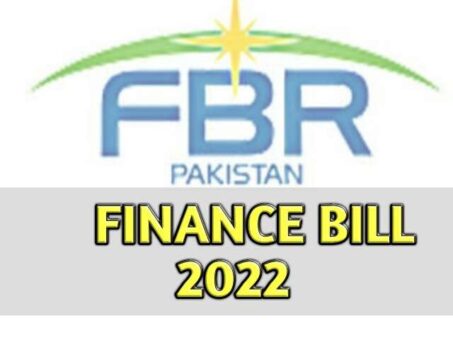ISLAMABAD: A new mechanism of Alternate Dispute Resolution (ADR) has been introduced through Finance Bill, 2022 to facilitate taxpayers.
The government on June 10, 2022 presented the federal budget 2022/2023. Through the budget various taxation measures and facilitation steps have been taken.
Through the Finance Bill, 2022 amendment to Section 134A of Income Tax Ordinance, 2001 has been suggested.
The text of proposed amended Section 134A is as follow:
READ MORE: FBR to disable mobile SIMs on non-filing of tax returns
“134A. Alternative Dispute Resolution. — (1) Notwithstanding any other provision of the Ordinance, or the rules made thereunder, an aggrieved person in connection with any dispute pertaining to—
(a) the liability of tax of one hundred million and above against the aggrieved person or admissibility of refund, as the case may be;
(b) the extent of waiver of default surcharge and penalty; or
(c) any other specific relief required to resolve the dispute; may apply to the Board for the appointment of a committee for the resolution of any hardship or dispute mentioned in detail in the application, which is under litigation in any court of law or an Appellate Authority, except where criminal proceedings have been initiated.
READ MORE: Pakistan amends tax laws to legalize money transfers
(2) The application for dispute resolution shall be accompanied by an initial proposition for resolution of the dispute, including an offer of tax payment, from which, the applicant would not be entitled to retract.
(3) The Board may, after examination of the application of an aggrieved person, appoint a committee, within forty five days of receipt of such application in the Board, comprising,—
(i) Chief Commissioner Inland Revenue having jurisdiction over the case;
(ii) person to be nominated by the taxpayer from a panel notified by the Board comprising –
(a) chartered accountants, cost and management accountants and advocates having a minimum of ten years’ experience in the field of taxation;
READ MORE: Fixed tax rates for retailers, payable through electricity bills
(b) officers of the Inland Revenue Service who have retired in BS 21 or above; or
(c) reputable businessmen as nominated by Chambers of Commerce and Industry:
Provided that the taxpayer shall not nominate a Chartered Accountant or an advocate if the said Chartered Accountant or the advocate is or has been an auditor or an authorized representative of the taxpayer; and
(d) person to be nominated through consensus by the members appointed under (i) and (ii) above, from the panel as notified by the Board in (ii) above:
Provided that where the member under this clause cannot be appointed through consensus, the
Board may nominate a member proposed by the taxpayer eligible to be nominated as per clause (ii).
(4) The aggrieved person, or the Commissioner, or both, as the case may be, shall withdraw the appeal pending before any court of law or an Appellate Authority, after constitution of the committee by the Board under sub-section (3), in respect of dispute as mentioned in sub-section (1).
(5) The committee shall not commence the proceedings under sub-section (6) unless the order of withdrawal by the court of law or the Appellate Authority is communicated to the Board:
READ MORE: Pakistan amends laws to hunt tax evaders living abroad
Provided that if the order of withdrawal is not communicated within seventy five days of the appointment of the committee, the said committee shall be dissolved and provisions of this section shall not apply.
(6) The Committee appointed under sub-section (3) shall examine the issue and may, if it deems necessary, conduct inquiry, seek expert opinion, direct any officer of the Inland Revenue or any other person to conduct an audit and shall decide the dispute by majority, within one hundred and twenty days of its appointment:
Provided that in computing the aforesaid period of one hundred and twenty days, the period, if any, for communicating the order of withdrawal under sub-section (5) shall be excluded.
(7) The decision by the Committee under sub-section (6) shall not be cited or taken as a precedent in any other case or in the same case for a different tax year.
(8) The recovery of tax payable by a taxpayer in connection with any dispute for which a Committee has been appointed under sub-section (3) shall be deemed to have been stayed on withdrawal of appeal up to the date of decision by the Committee or the dissolution of the Committee whichever is earlier.
(9) The decision of the committee under sub-section (6) shall be binding on the Commissioner and the aggrieved person.
(10) If the Committee fails to decide within the period of one hundred and twenty days under sub-section (6), the Board shall dissolve the committee by an order in writing and the matter shall be decided by the court of law or the Appellate Authority which issued the order of withdrawal under sub-section (5) and the appeal shall be treated to be pending before such court of law or the Appellate Authority as if the appeal had never been withdrawn.
READ MORE: CGT up to 15% slapped on immovable properties
(11) The Board shall communicate the order of dissolution to the court of law or the Appellate Authority and the Commissioner.
(12) The aggrieved person, on receipt of the order of dissolution, shall communicate it to the court of law or the Appellate Authority, which shall decide the appeal within six months of the communication of said order.
(13) The aggrieved person may make the payment of income tax and other taxes as decided by the committee under sub-section (6) and all decisions, orders and judgments made or passed shall stand modified to that extent.
(14) The Board may prescribe the amount to be paid as remuneration for the services of the members of the Committee, other than the member appointed under clause (i) of sub-section (3).
(15) The Board may, by notification in the official Gazette, make rules for carrying out the purposes of this section.”
